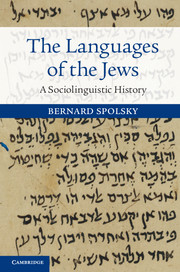Book contents
- Frontmatter
- Dedication
- Contents
- List of maps
- Preface and acknowledgments
- Glossary
- 1 Is Hebrew an endangered language?
- 2 The emergence of Hebrew
- 3 Hebrew–Aramaic bilingualism and competition
- 4 Three languages in Hellenistic and Roman Palestine
- 5 From statehood to Diaspora
- 6 The Arabian and African connections
- 7 The spread of Islam
- 8 The Jews of France
- 9 The Jews of Spain and their languages
- 10 Loter-Ashkenaz and the creation of Yiddish
- 11 The Yavanic area: Greece and Italy
- 12 Jews in Slavic lands
- 13 Linguistic emancipation and assimilation in Europe
- 14 Britain, its former colonies, and the New World
- 15 Islam and the Orient
- 16 The return to Zion and Hebrew
- Appendix Estimated current status of Jewish languages1
- Notes
- References
- Index
14 - Britain, its former colonies, and the New World
Published online by Cambridge University Press: 05 June 2014
- Frontmatter
- Dedication
- Contents
- List of maps
- Preface and acknowledgments
- Glossary
- 1 Is Hebrew an endangered language?
- 2 The emergence of Hebrew
- 3 Hebrew–Aramaic bilingualism and competition
- 4 Three languages in Hellenistic and Roman Palestine
- 5 From statehood to Diaspora
- 6 The Arabian and African connections
- 7 The spread of Islam
- 8 The Jews of France
- 9 The Jews of Spain and their languages
- 10 Loter-Ashkenaz and the creation of Yiddish
- 11 The Yavanic area: Greece and Italy
- 12 Jews in Slavic lands
- 13 Linguistic emancipation and assimilation in Europe
- 14 Britain, its former colonies, and the New World
- 15 Islam and the Orient
- 16 The return to Zion and Hebrew
- Appendix Estimated current status of Jewish languages1
- Notes
- References
- Index
Summary
A personal history
A recent book dealing with the challenge of postmodernism to those who write Jewish history recognizes the problem of historians’ personal history in shaping their views of what they are describing and analyzing. By now, I am sure you have become aware of my prejudices as I have recounted the sociolinguistic history of the Jews: my background as a Zionist modern orthodox Israeli brought up as a speaker of English and now living by choice in a Hebrew-dominated society. In this chapter, which deals with the addition of English and Spanish to the sociolinguistic ecology of the Jews, I start with a personal autobiographical account of the languages of my own background, which will give me a chance to depict the changes that have occurred to many Jews in the last two centuries or so.
My mother’s oldest known ancestor was Jane Benjamin, identified in the 1841 British census as a forty-six-year-old hawker living with her daughter in the East End of London. Born in about 1795 in Holland, she probably married in London in 1816. My assumption is that she was a Yiddish-speaking Ashkenazi who picked up enough English to be able to work as a peddler. Her daughter, Esther, was born in London, presumably growing up bilingual in Yiddish and English. In 1860 Esther became the wife of Julius Green, a Polish-born tailor who had arrived in England some time before 1848, when he was married by the Chief Rabbi to Mary Solomons, London-born, who died ten years later after bearing two children.
- Type
- Chapter
- Information
- The Languages of the JewsA Sociolinguistic History, pp. 216 - 233Publisher: Cambridge University PressPrint publication year: 2014



